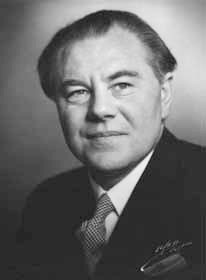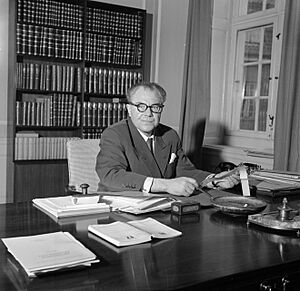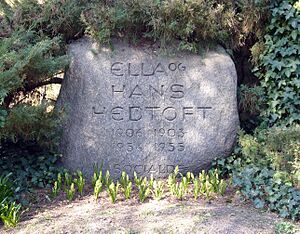Hans Hedtoft facts for kids
Quick facts for kids
Hans Hedtoft
|
|
|---|---|
 |
|
| 14th Prime Minister of Denmark | |
| In office 30 September 1953 – 29 January 1955 |
|
| Monarch | Frederik IX |
| Preceded by | Erik Eriksen |
| Succeeded by | H. C. Hansen |
| In office 13 November 1947 – 30 October 1950 |
|
| Monarch | Frederik IX |
| Preceded by | Knud Kristensen |
| Succeeded by | Erik Eriksen |
| President of the Nordic Council | |
| In office 14 February 1953 – 31 December 1953 |
|
| Preceded by | Position established |
| Succeeded by | Einar Gerhardsen |
| Minister of Social Affairs | |
| In office 5 May 1945 – 7 November 1945 |
|
| Prime Minister | Vilhelm Buhl |
| Preceded by | Laurits Hansen |
| Succeeded by | Søren Peter Larsen |
| Personal details | |
| Born | 21 April 1903 Aarhus, Denmark |
| Died | 29 January 1955 (aged 51) Stockholm, Sweden |
| Political party | Social Democrats |
| Spouse | Ella Gudrun Ingeborg Holleufer |
Hans Hedtoft Hansen (born April 21, 1903 – died January 29, 1955) was an important Danish politician. He was a member of the Social Democrats party. He served as the Prime Minister of Denmark two times. His first term was from 1947 to 1950. His second term was from 1953 until his death in 1955. He also became the first President of the Nordic Council in 1953.
Hans Hedtoft was married to Ella Gudrun Ingeborg Holleufer. She passed away in 1954 when she was 48 years old.
Contents
Hans Hedtoft's Political Journey
Hans Hedtoft was a leading figure in the Social Democrat party. He took over as the party's leader in 1939. During World War II, he was forced to step down from his roles in 1941. This happened because he openly criticized the German occupation of Denmark. In September 1943, he played a key role in helping to save Danish Jews.
Important Changes as Prime Minister
While Hans Hedtoft was Prime Minister, Denmark saw many new changes. One big change was the introduction of progressive taxation. This means people who earned more money paid a higher percentage in taxes. This system helps to share wealth more fairly.
Other important laws were also passed. The Public Assistance Act of 1949 helped people with specific health conditions, like tuberculosis. It gave them special support instead of just general aid. A law in 1950 also created special help for deaf and partially deaf people.
The Home Help Act of 1949 made sure that towns and cities offered home help services. These services assisted people who needed support in their homes. Rules for pottery factories were also put in place to ensure fair practices.
Denmark Joins NATO
After World War II, countries wanted to create alliances for safety. There was an idea to form a defense union just for Scandinavian countries. When this idea didn't work out, Denmark decided to join NATO in 1949. NATO is a military alliance that helps protect its member countries.
In October 1950, Hans Hedtoft's government faced a challenge. They lost a vote about ending the rationing of butter. This showed that his party no longer had enough support in parliament. Because of this, new elections were called. Erik Eriksen from the Liberal Party then became Prime Minister.
Returning to Power
On September 30, 1953, Hans Hedtoft became Prime Minister again. He formed a new government made up only of Social Democrats. However, the Danish Social Liberal Party did not support him. They were concerned about how much money was being spent on the military due to Denmark's commitments to NATO.
A Sad Ending and a Ship's Story
On January 29, 1955, Hans Hedtoft sadly passed away suddenly. He had a heart attack during a meeting of the Nordic Council in Stockholm, Sweden. His friend and Foreign Minister, H. C. Hansen, took over as Prime Minister.
A ship was named after him, the MS Hans Hedtoft. Sadly, on its very first trip in 1959, the ship hit an iceberg. It sank off the coast of Greenland. This was the last known ship to be sunk by an iceberg with people on board. There were no survivors from this tragic event.
Images for kids
 | Mary Eliza Mahoney |
 | Susie King Taylor |
 | Ida Gray |
 | Eliza Ann Grier |



